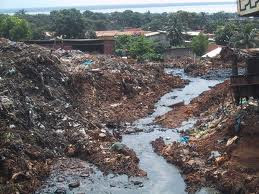- The Water (Prevention and Control of Pollution) Act was enacted in 1974 to provide for the prevention and control of water pollution, and for the maintaining or restoring of wholesomeness of water in the country. The Act was amended in 1988.
- The Water (Prevention and Control of Pollution) Cess Act was enacted in 1977, to provide for the levy and collection of a cess on water consumed by persons operating and carrying on certain types of industrial activities. This cess is collected with a view to augment the resources of the Central Board and the State Boards for the prevention and control of water pollution constituted under the Water (Prevention and Control of Pollution) Act, 1974. The Act was last amended in 2003.
Preserve Environment
Only when the last tree has died and the last river been poisoned and the last fish been caught will we realize we cannot eat money.
Thursday 21 July 2011
Water Pollution Act
Tuesday 19 July 2011
Aam Junta participation a must for environment protection
If the environment protection campaigns have to gather momentum in true sense, separate individual efforts done in silos by NGOs, a few individuals may not lead to concrete results. What needs to happen is that the mass population of India including individuals, NGOs, Government bodies, industrialists, manufacturers and policy makers need to understand the importance of this cause and prioritize it high. School education can play an important role here in imbibing the importance of environment in the newer generations to come. These kind of efforts need to be replicated or done in integrated manner at international level in order to achieve reasonable results on this front.
Once again this cause can not be reasonably accomplished unless Aam Junta participates with full heart, with the right priority after understanding the gravity of the environment problem.
Information on Environment Protection Act
The Environment (Protection) Act was enacted in 1986 with the objective of providing for the protection and improvement of the environment. It empowers the Central Government to establish authorities [under section 3(3)] charged with the mandate of preventing environmental pollution in all its forms and to tackle specific environmental problems that are peculiar to different parts of the country. The Act was last amended in 1991.
The power conferred by the Environment Protection Act are followed under the following heads:
The power conferred by the Environment Protection Act are followed under the following heads:
Monday 18 July 2011
Ministry of Environments and Forests - About the Ministry
The Ministry of Environment & Forests (MoEF) is the nodal agency in the administrative structure of the Central Government for the planning, promotion, co-ordination and overseeing the implementation of India's environmental and forestry policies and programmes.
The primary concerns of the Ministry are implementation of policies and programmes relating to conservation of the country's natural resources including its lakes and rivers, its biodiversity, forests and wildlife, ensuring the welfare of animals, and the prevention and abatement of pollution. While implementing these policies and programmes, the Ministry is guided by the principle of sustainable development and enhancement of human well-being.
The Ministry also serves as the nodal agency in the country for the United Nations Environment Programme (UNEP), South Asia Co-operative Environment Programme (SACEP), International Centre for Integrated Mountain Development (ICIMOD) and for the follow-up of the United Nations Conference on Environment and Development (UNCED). The Ministry is also entrusted with issues relating to multilateral bodies such as the Commission on Sustainable Development (CSD), Global Environment Facility (GEF) and of regional bodies like Economic and Social Council for Asia and Pacific (ESCAP) and South Asian Association for Regional Co-operation (SAARC) on matters pertaining to the environment.
The broad objectives of the Ministry are:
· Conservation and survey of flora, fauna, forests and wildlife
· Prevention and control of pollution
· Afforestation and regeneration of degraded areas
· Protection of the environment and
· Ensuring the welfare of animals
These objectives are well supported by a set of legislative and regulatory measures, aimed at the preservation, conservation and protection of the environment. Besides the legislative measures, the National Conservation Strategy and Policy Statement on Environment and Development, 1992; National Forest Policy, 1988; Policy Statement on Abatement of Pollution, 1992; and the National Environment Policy, 2006 also guide the Ministry's work.
Let's conserve environment at least for our children..
Your grandchildren will likely find it incredible - or even sinful - that you burned up a gallon of gasoline to fetch a pack of cigarettes! ~Paul MacCready, Jr.
Sunday 17 July 2011
Small practical steps to save the environment
There are small easy and practical steps that we can take in our day to day life to save the environment:
1) Clean or replace air filters of your aircon regularly.
2) When using an oven, minimize door opening while it is in use.
3) Turn off lights, computers and other appliances when not in use.
4) Walk or ride your bike instead of driving, whenever possible.
5) Join a carpool to get to work.
6) Check and fix any water leaks.
7) Use CFLs instead of light bulbs.
8) Copy and print on both sides of the paper.
9) Use emails instead of paper correspondence whenever possible.
10) Plant trees.
1) Clean or replace air filters of your aircon regularly.
2) When using an oven, minimize door opening while it is in use.
3) Turn off lights, computers and other appliances when not in use.
4) Walk or ride your bike instead of driving, whenever possible.
5) Join a carpool to get to work.
6) Check and fix any water leaks.
7) Use CFLs instead of light bulbs.
8) Copy and print on both sides of the paper.
9) Use emails instead of paper correspondence whenever possible.
10) Plant trees.
Environment - Who knows till when
The environment has been abused in the name of growth, the corporate and country think tanks have failed in striking the balance between growth and protecting environment. The cost of growth can be really heavy, as the cost in terms of adverse affect on environment has been so far not taken up seriously, who knows till when is the question now - how long the circle would complete and people would realize that growth exists only when survival is there - Its high time now to take immediate steps to protect the environment as no one knows till when we would last to talk about growth at the cost of environment.
Subscribe to:
Posts (Atom)




